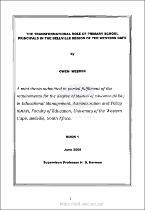| dc.description.abstract | In retrospect in education, many changes and initiatives for restructuring have taken place in South Africa since 1994, among others: from
apartheid to a democratic societ5r, from discrimination to equity and from Christian National Education to Outcomes-based Education. This study illuminates the transformational role of the principal, amidst restructuring, changes and transformation. The central focus of this study
was to determine and capture how the principals perceived their roles as transformational leaders. This study highlights the challenges, dilemmas and problems that the primary school principals face in their different settings: affluent, semi affluent and economically challenged areas. The researcher reviewed local and international literature on the transformational role of the principal in order to develop a conceptual understanding and insight. The research study that was done reflected on how the primary school principals, in the affluent, semi-affluent and economically challenged areas, perceive their role as educational leaders. Six primary school principals and six School Management Team educators were interviewed. The researcher concentrated on the perspective of Leithwood et al of transformational leadership. This transformational leadership model conceptualises leadership as follows: building school vision, establishing school goals, providing intellectual stimulation, offering individualised support, modelling best practices, creating a productive school culture and developing structures to foster participation in school decisions. Data was collected using semi-structured interviews and a documentary
review. The researcher used a digital voice recorder to capture the interviews. The interviews were transcribed and the data were categorised according to the Leithwood model of transformational leadership. The documentary review entailed key laws, acts, policies and resolutions aimed at bringing about major change in education. The findings revealed that principals as 'change agent's have a challenging
and complex role to play. Some school environment's has many challenges such as limited resources, overcrowded classes and an unmanageable workload of principals. The massive administrative burden on educators and the diverse contexts in which the educators and principals have to perform can result in that a school's vision is jeopardised. Finally, a number of recommendations were made on how the principal or aspiring principals need to be adequately prepared or trained for the principalship. In order to shift towards quality education, the principals and educators need to be empowered so that they can fulfill their leadership roles. | en_US |

